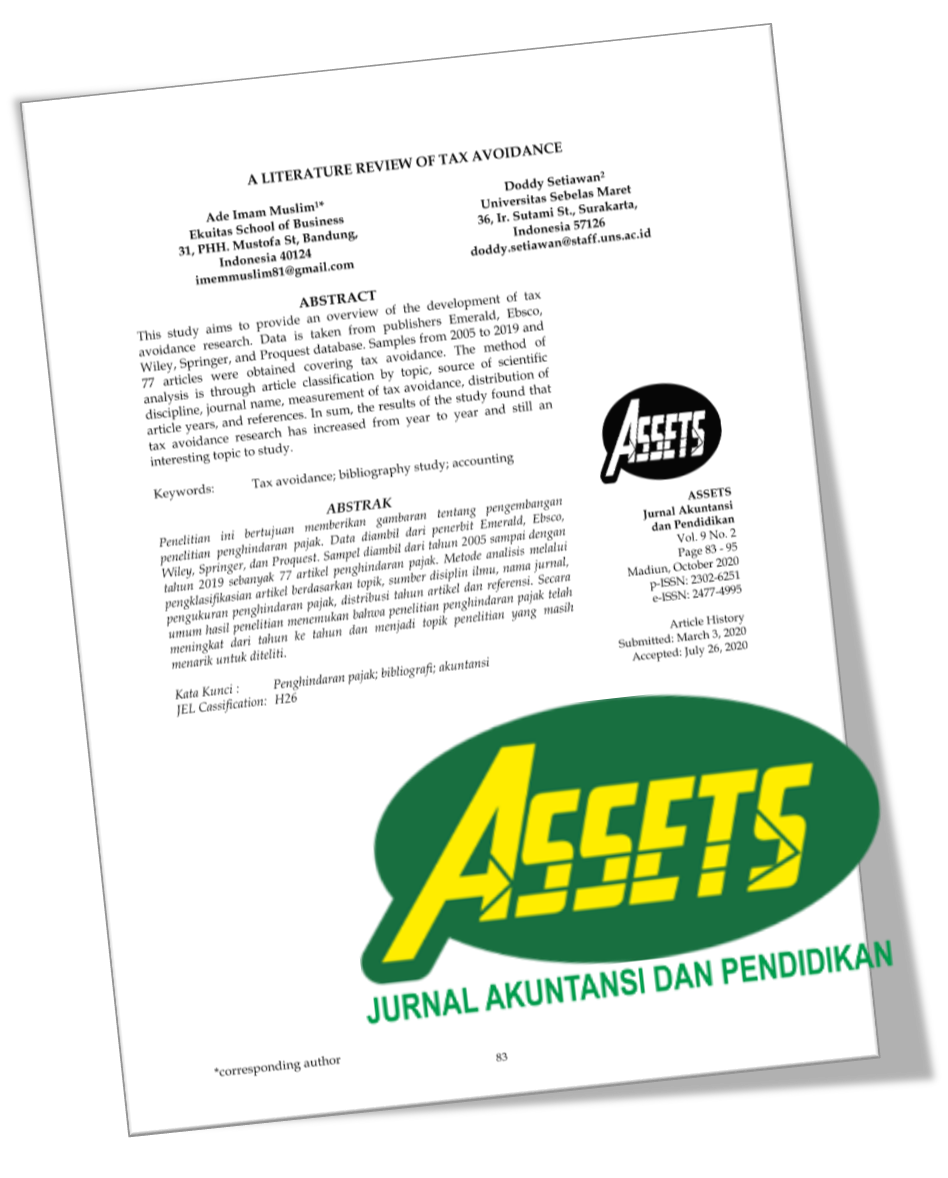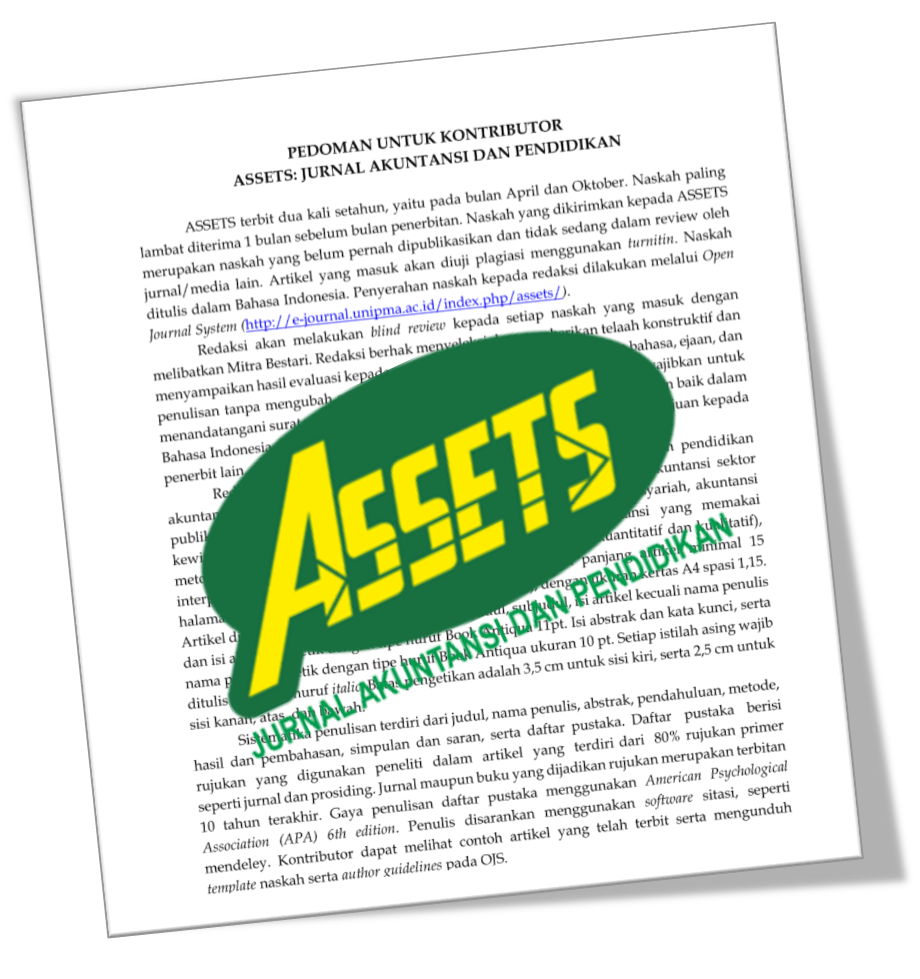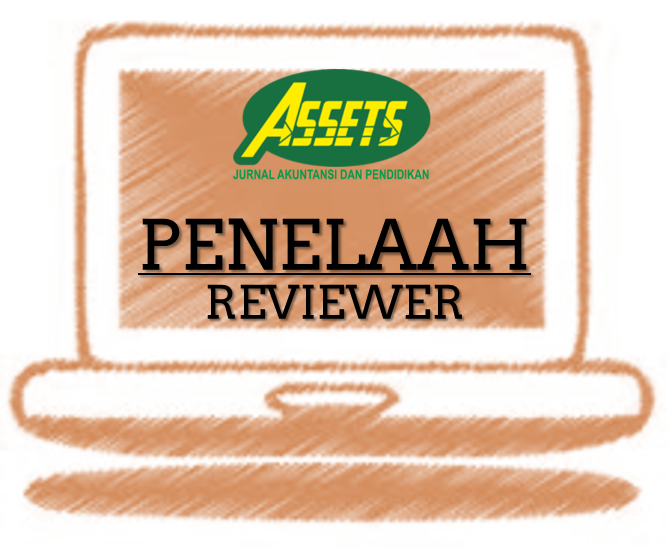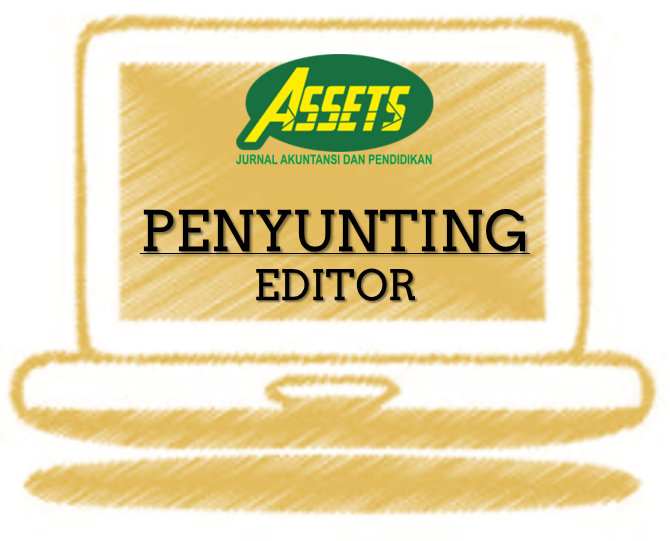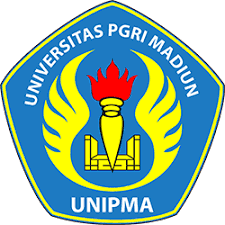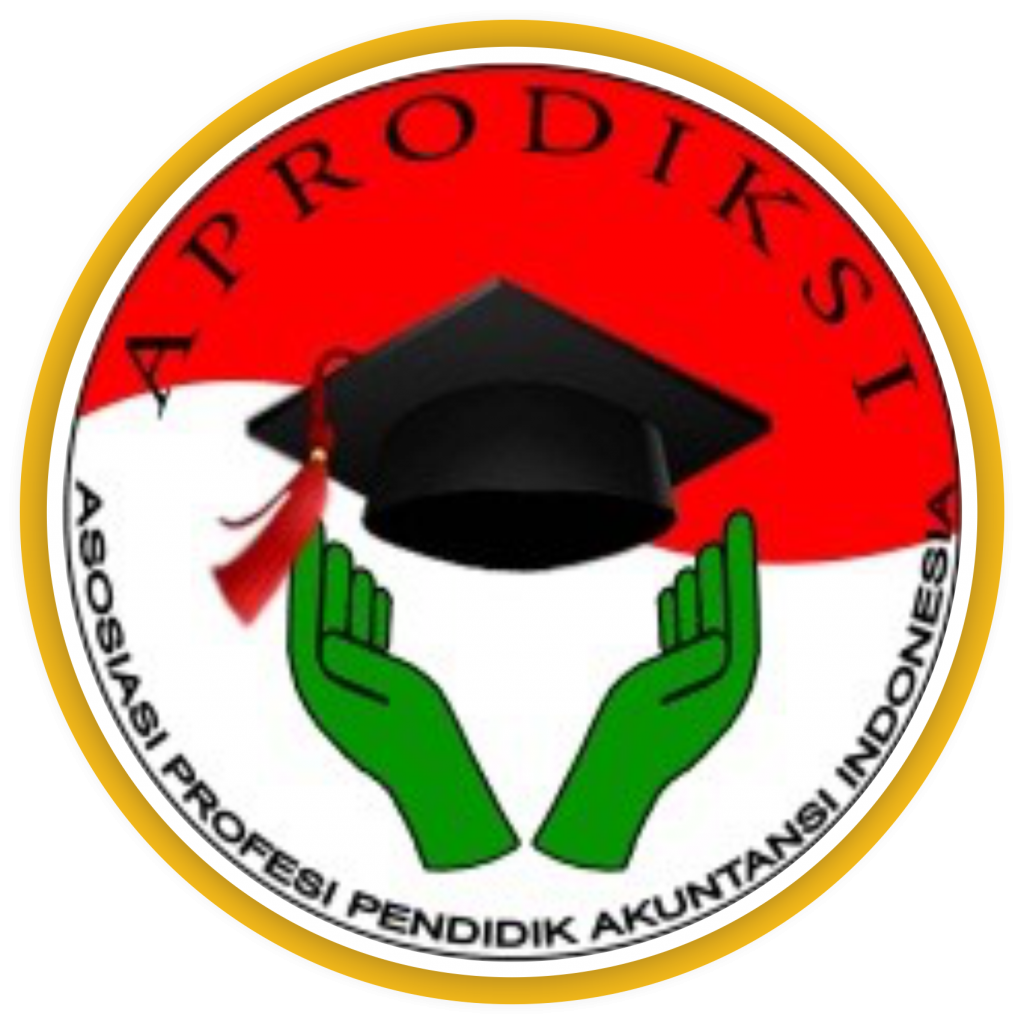Integrated Reporting’s Impact on Corporate Governance: Study in Asean Capital Market
Abstract
ABSTRACT
Integrated reporting (IR) that merges the firm's financial and non-financial information into one single reporting is the latest evolution of corporate financial reporting today. This study purposes to examine the impact of the implementation of IR on corporate governance, especially family business in the mining industry listed on the ASEAN capital market in the 2014-2017 period. The results of the study based on the Stata 14.2 statistical program concluded that the implementation of IR has a positive impact on corporate governance in the ASEAN capital market, i.e. the implementation of IR drivers changes in behavior and perceptions in corporate governance (reporting driven behavior), thus making corporate governance more effective.
ABSTRACT
Pelaporan terintegrasi (IR) yang menyatukan informasi keuangan dan non-keuangan perusahaaan ke dalam satu pelaporan tunggal merupakan evolusi pelaporan keuangan perusahaan terbaru saat ini. Penelitian ini bertujuan untuk meneliti dampak penerapan pelaporan terintegrasi (IR) terhadap tata kelola perusahaan, khususnya perusahaan keluarga dalam industri pertambangan yang terdaftar di pasar modal ASEAN tahun 2014 s.d. 2017. Hasil penelitian berdasarkan program statistik Stata 14.2 menyimpulkan bahwa penerapan pelaporan terintegrasi (IR) berpengaruh positif terhadap tata kelola perusahaan di pasar modal ASEAN, yaitu bahwa penerapan pelaporan terintegrasi (IR) memicu terjadinya perubahan perilaku dan persepsi dalam tata kelola perusahaan (reporting driven behavior), sehingga menjadikan tata kelola perusahaan menjadi lebih efektif.
Keywords
Full Text:
PDFReferences
ACMF. (2017). ASEAN Corporate Governance Scorecard v.2.0. Retrieved May 12, 2017, from http://www.theacmf.org/images/downloads¬/pdf/asean¬_cg_¬scorecard-_12_may¬_2017.pdf.
Ang, J. S., Cole, R. A., & Lin, J. W. (2000). Agency costs and ownership structure. The Journal of Finance, 55(1), 81-106.
Asian Development Bank (ADB). (2017). ASEAN Corporate Governance Scorecard Country Reports and Assessments 2015. Retrieved October 15, 2017, from https://¬www.adb.org¬/¬sites/¬default/¬files/publication/¬375481¬/¬asean-cgscorecard-2015.pdf.
Astuti, Elly. (2015). Studi Literatur: Pengaruh Corporate Governance Terhadap Nilai Perusahaan. Assets: Jurnal Akuntansi dan Pendidikan, 4(1), 68-72.
Atkins, J. F., & Maroun, W. (2015). Integrated reporting in South Africa in 2012: perspectives from South African institutional investors. Meditari Accountancy Research, 23(2), 197-221.
Baboukardos, D., & Rimmel, G. (2016). Value relevance of accounting information under an integrated reporting approach: a research note. Journal of Accounting and Public Policy, 35(4), 437-452.
Balasan, A. (2014). Family-owned businesses in Asia: their political-economic power. International Journal of Technology Enhancements and Emerging Engineering Research, 2(9), 98-100.
Balasingam, S., Arumugam D., Hui, K.A. (2019). The Challenges in Adopting and Implementing Integrated Reporting in Public Listed Companies in Malaysia. International Journal of Recent Technology and Engineering, 7(58), 2278-3075.
Bananuka, J., Tumwebaze, Z., & Orobia, L. (2019). The adoption of integrated reporting: a developing country perspective. Journal of Financial Reporting and Accounting, 17(1), 2-23.
Bidhan L. P., Freeman R. E., Harrison J. S., Wicks A. C., Purnell, L., & de Colle S. (2010). Stakeholder theory: the state of the art. The Academy of Management Annals, 4(1), 403-445.
Brigham & Houston. (2010). Dasar-dasar Manajemen Keuangan (Edisi III). Jakarta: Salemba Empat.
Burke, J. J., & Clark, C. E. (2016). The business case for integrated reporting: Insights from leading practitioners, regulators, and academics. Business Horizons, 59(3), 273-283.
Carels, C., Maroun, W., & Padia, N. (2013). Integrated reporting in the South African mining sector. Corporate Ownership and Control, 11(1), 991-1005.
Chaidali, P. P., & Jones, M. J. (2017). It’s a matter of trust: exploring the perceptions of integrated reporting preparers. Critical Perspectives on Accounting, 48, 1-20.
Churet, C., & Eccles, R. G. (2014). Integrated reporting, quality of management, and financial performance. Journal of Applied Corporate Finance, 26(1), 56-64.
Colvert, K. (2016). Integrated reporting: the view from Asia. Retrieved May 13, 2016, from http://csj.hkics.org.hk/site/¬2016/05/13/¬integrated-¬reporting-¬the-view-from-asia.
Cosma, S., Soana, M. G., & Venturelli, A. (2018). Does the market reward integrated report quality? African Journal of Business Management, 12(4), 78-91.
Davies, J., de Bruin, D., Deysel, M., & Strydom, M. (2002). The SA mining industry enters the HIV/AIDS war zone. Meditari Accountancy Research, 10(1), 25-51.
De Villiers, C. J., & Barnard, P. (2000). Environmental reporting in South Africa from 1994 to 1999: a research note. Meditari Accountancy Research, 8(1), 15-23.
De Villiers, C. J., & Van Staden, C. J. (2006). Can less environmental disclosure have a legitimising effect? evidence from Africa. Accounting, Organizations and Society, 31(8), 763-781.
De Villiers, C. J., Venter, E. R., & Hsiao, P. C. K. (2016). Integrated reporting: background, measurement issues, approaches and an agenda for future research. Accounting & Finance, 57(4), 937-959.
De Villiers, C. J., Hsiao, P. C. K., & Maroun, W. (2017). Developing a conceptual model of influences around integrated reporting, new insights and directions for future research. Meditari Accountancy Research, 25(4), 450-460.
Doni, F., Gasperini, A., & Pavone, P. (2016). Early adopters of integrated reporting: The case of the mining industry in South Africa. African Journal of Business Management, 10(9), 187.
Dumay, J., Bernardi, C., Guthrie, J., & La Torre, M. (2017). Barriers to implementing the International Integrated Reporting Framework: a contemporary academic perspective. Meditari Accountancy Research, 25(4), 461-480.
Eccles, R. G., & Krzus, M. P. (2010). One Report: Integrated Reporting for a Sustainable Strategy. John Wiley & Sons.
Esch, M., Schnellbacher, B., & Wald, A. (2019). Does integrated reporting information influence internal decision making? an experimental study of investment behavior. Business Strategy and the Environment, 28(4), 599-610.
Garcia-Sanchez, I. M., Rodriguez-Ariza, L., & Frias-Aceituno, J.V. (2013). The cultural system and integrated reporting. International Business Review, 22(5), 828-838.
Garcia‐Sanchez, I. M., & Noguera‐Gamez, L. (2017). Integrated reporting and stakeholder engagement: the effect on information asymmetry. Corporate Social Responsibility and Environmental Management, 24(5), 395-413.
Garcia-Sanchez, I. M., & Noguera-Gamez, L. (2017). Integrated information and the cost of capital. International Business Review, 26(5), 959-975.
Ghani, E. K., Jamal, J., Puspitasari, E., & Gunardi, A. (2018). Factors influencing integrated reporting practices among Malaysian public listed real property business: a sustainable development effort. International Journal of Managerial and Financial Accounting, 10(2), 144-162.
Gibassier, D., Rodrigue, M., & Arjalies, D. L. (2018). "Integrated reporting is like God: no one has met Him, but everybody talks about Him” The power of myths in the adoption of management innovations. Accounting, Auditing & Accountability Journal, 31(5), 1349-1380.
Gujarati, D. N., & Porter, D. C. (2009). Basic Econometrics (5th ed.). The McGraw-Hill Series Economics.
Haalien, L., & Huse, M. (2005). Board of Directors in Norwegian Family Businesses: Results from the Value Creating Board Surveys. Retrieved August 12, 2016, from http://web.bi.no/forskning/papers.nsf/0/b209d28beda08bc8c125706600426a8e/$FILE/2005-07-haalien¬_huse.¬pdf.
Hadianto, Mardono. (2013). Pertambangan Jadi Andalan ASEAN. Retrieved April 10, 2016, from http://ima-api.com/index.php?option=com_-content&view=article&¬id=870:¬pertam¬bang¬¬¬an-jadi-andalan-asean&catid¬=47-:media-news&Item¬id=98&¬lang¬=id.
Higgins, C., Stubbs, W., Tweedie, D., & McCallum, G. (2019). Journey or toolbox? integrated reporting and processes of organisational change. Accounting, Auditing & Accountability Journal, 32(6), 1662-1689.
Hindley, T., & Buys, P. W. (2012). Integrated reporting compliance with the Global Reporting Initiative framework: an analysis of the South African mining industry. The International Business & Economics Research Journal (Online), 11(11), 1249.
Ho, S. S., & Wong, K. S. (2001). A study of the relationship between corporate governance structures and the extent of voluntary disclosure. Journal of International Accounting, Auditing and Taxation, 10(2), 139-156.
Hoque, M. E. (2017). Why business should adopt integrated reporting? International Journal of Economics and Financial Issues, 7(1), 241-248.
Hsiao, P. C. K., & Kelly, M. (2018). Investment considerations and impressions of integrated reporting: Evidence from Taiwan. Sustainability Accounting, Management and Policy Journal, 9(1), 2-28.
Idowu, Samuel O., & Baldo Mara Del. (2019). Integrated Reporting: Antecedents and Perspectives for Organizations and Stakeholders. Springer Nature Switzerland AG.
IIRC. (2011). The Future of Corporate Reporting: Towards a Common Vision. Retrieved March 14, 2016, from https://www.kpmg.at/uploads¬/media/The_Future_-of_Corporate_Reporting_ Web.pdf.
IIRC. (2013). The International Framework. Retrieved March 15, 2016, from https://integrated¬reporting.org/wp-content/uploads¬/2013/12/¬13-12-08¬-THE-INTER¬NATIO¬NAL-IR-FRAME¬WORK-2-1.pdf.
Kaya, C. T., Erguden, A., & Ar, Z. S. (2016). Essence of integrated reporting: a holistic framework for sustainability and value creation. International Journal of Academic Research in Accounting, Finance and Management Sciences, 6(1), 29-34.
Knauer, A., & Serafeim, G. (2014). Attracting long-term investors through integrated thinking and reporting: a clinical study of a biopharmaceutical company. Journal of Applied Corporate Finance, 26(2), 57-64.
Krzus, M. P. (2011). Integrated reporting: if not now, when. Zeitschrift für internationale Rechnungslegung, 6, 271-276.
Kurniawan, P. S., & Wahyuni, M. A. (2018). Factors Affecting Business's Capability in Performing Integrated Reporting: an Empirical Evidence from Indonesia. Assets: Jurnal Akuntansi dan Pendidikan, 7(2), 141-155.
Lodhia, S., & Hess, N. (2014). Sustainability accounting and reporting in the mining industry: current literature and directions for future research. Journal of Cleaner Production, 84, 43-50.
Loh, L., Thao, N. T. P., Lee, S. P., & Thomas, T. (2018). Corporate Disclosure On Business Integrity in ASEAN. Retrieved August 12, 2018, from https://www.asean-csr-net¬work.org/c/images/CorporateDisclosure¬on-BusinessIntegrityinASEAN¬FINAL.pdf.
Lopes, A. I., & Coelho, A. M. (2018). Engaged in integrated reporting? evidence across multiple organizations. European Business Review, 30(4), 398-426.
Madison, Kristen Joie. (2014). Agency Theory and Stewardship Theory Integrated, Expanded, and Bounded by Context: An Empirical Investigation of Structure, Behavior, and Performance within Family Business. Retrieved April 15, 2018, from http://¬trace.tennessee.edu/¬utk_graddiss/2711.
Menicucci, E. (2018). Exploring forward-looking information in integrated reporting: a multi-dimensional analysis. Journal of Applied Accounting Research, 19(1), 102-121.
Mervelskemper, L., & Streit, D. (2017). Enhancing market valuation of ESG performance: is integrated reporting keeping its promise? Business Strategy and the Environment, 26(4), 536-549.
Mio, C., Marco, F., & Pauluzzo, R. (2016). Internal application of IR principles: generali's internal integrated reporting. Journal of Cleaner Production, 139, 204-218.
OECD. (2014), Risk Management and Corporate Governance, Corporate Governance. Paris: OECD Publishing.
Otoritas Jasa Keuangan (OJK). (2014). Roadmap Keuangan Keberlanjutan di Indonesia (Roadmap for Sustainable Finance in Indonesia) 2015-2019. Retrieved June 20, 2016, from https://www.ojk.go.id/id/berita-dan-kegiatan/publikasi¬/Do-cuments¬/¬Pages/¬Road¬map-Keuangan-Keberlanjutan-2015-2019-di Indonesia/-roadmap-¬keuangan-keberlanjutan-2015-2019-di-indonesia.pdf.
Pavlopoulos, A., Magnis, C., & Iatridis, G. E. (2017). Integrated reporting: is it the last piece of the accounting disclosure puzzle? Journal of Multinational Financial Management, 41, 23-46.
Pavlopoulos, A., Magnis, C., & Iatridis, G. E. (2019). Integrated reporting: an accounting disclosure tool for high-quality financial reporting. Research in International Business and Finance, 49, 13-40.
Perego, P., Kennedy, S., & Whiteman, G. (2016). A lot of icing but little cake? taking integrated reporting forward. Journal of Cleaner Production, 136, 53-64.
Ramo, H. (2011). Visualizing the phronetic organization: the case of photographs in CSR reports. Journal of Business Ethics, 104, 371-387.
Richerson, P. J., & Boyd, R. (2008). Not by Genes Alone: How Culture Transformed Human Evolution. University of Chicago Press.
Rinaldi, L., Unerman, J., & De Villiers, C. (2018). Evaluating the integrated reporting journey: insights, gaps and agendas for future research. Accounting, Auditing & Accountability Journal, 31(5), 1294-1318.
Robertson, F. A., & Samy, M. (2015). Factors affecting the diffusion of integrated reporting: a UK FTSE 100 perspective. Sustainability Accounting, Management and Policy Journal, 6(2), 190-223.
Roxana-Ioana, B., & Petru, S. (2017). Integrated reporting for a good corporate governance. Ovidius University Annals, 17(1), 424-428.
Schall, V., & Harley. (1992). Financial Management. New Jersey: Prantice Hall.
Serafeim, G. (2015). Integrated reporting and investor clientele. Journal of Applied Corporate Finance, 27(2), 34-51.
Siebels, J. F., & Zu Knyphausen‐Aufse, D. (2012). A review of theory in family business research: the implications for corporate governance. International Journal of Management Reviews, 14(3), 280-304.
Singhapakdi, A., Karande, K., Rao, C., & Vitell, S. J. (2001). How important are ethics and social responsibility? a multinational study of marketing professionals. European Journal of Marketing, 35(1/2), 133-153.
Slack, R., & Tsalavoutas, I. (2018). Integrated reporting decision usefulness: mainstream equity market views. Accounting Forum, 42(2), 184-198.
Sofian, I., & Dumitru, M. (2017). The compliance of the integrated reports issued by European financial companies with the international integrated reporting framework. Sustainability, 9(8), 1319, 1-16.
Soler, I. P., Gemar, G., & Guerrero-Murillo, R. (2017). Family and non-family business behavior in the wine sector: a comparative study. European Journal of Family Business, 7(1-2), 65-73.
Steyn, M. (2014). Organisational benefits and implementation challenges of mandatory integrated reporting: perspectives of senior executives at South African listed companies. Sustainability Accounting, Management and Policy Journal, 5(4), 476-503.
Stone, G. W., & Lodhia, S. (2019). Readability of integrated reports: an exploratory global study. Accounting, Auditing & Accountability Journal, 32(5), 1532-1557.
Su, S. H. (2006). Cultural differences in determining the ethical perception and decision-making of future accounting professionals: a comparison between accounting students from Taiwan and the United States. Journal of American Academy of Business, 9(1), 147-158.
Tho, Alexis See. (2019). Integrated Reporting Gains Momentum in Asia. Retrieved May 17, 2019, from https://www.fm-maga¬zine.com/news/2019¬/may¬/inte¬grated¬-report¬ing-gains-momen¬tum-in-asia-201921169.html.
Valentine, S., & Fleischman, G. (2008). Professional ethical standards, corporate social responsibility, and the perceived role of ethics and social responsibility. Journal of Business Ethics, 82(3), 657-666.
Vaz, N., Fernandez‐Feijoo, B., & Ruiz, S. (2016). Integrated reporting: an international overview. Business Ethics: A European Review, 25(4), 577-591.
Velte, P., & Stawinoga, M. (2017). Integrated reporting: the current state of empirical research, limitations and future research implications. Journal of Management Control, 28(3), 275-320.
Vesty, G. M., Ren, C., & Ji, S. (2018). Integrated reporting as a test of worth: a conversation with the chairman of an integrated reporting pilot organisation. Accounting, Auditing & Accountability Journal, 31(5), 1406-1434.
Wang, J. (2016). Literature review on the impression management in corporate information disclosure. Modern Economy, 7(06), 725.
Zhou, S., Simnett, R., & Green, W. (2017). Does integrated reporting matter to the capital market? Abacus, 53(1), 94-132.
Article Metrics
Abstract has been read : 3388 timesPDF file viewed/downloaded: 0 times
DOI: http://doi.org/10.25273/jap.v9i1.5383
Refbacks
- There are currently no refbacks.
Copyright (c) 2020 Shanti Shanti, Bambang Tjahjadi, I Made Narsa

This work is licensed under a Creative Commons Attribution-ShareAlike 4.0 International License.
ASSETS: Jurnal Akuntansi dan Pendidikan is supported by
ASSETS: Jurnal Akuntansi dan Pendidikan is indexed by
| | | ||||
| | | | |

ASSETS: Jurnal Akuntansi dan Pendidikan is licensed under a Creative Commons Attribution-ShareAlike 4.0 International License.

